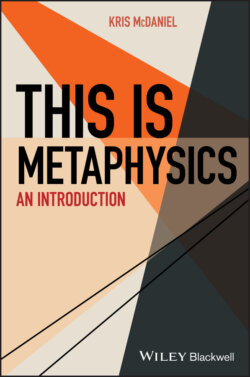This Is Metaphysics

Реклама. ООО «ЛитРес», ИНН: 7719571260.
Оглавление
Kris McDaniel. This Is Metaphysics
Table of Contents
List of Illustrations
Guide
Pages
THIS IS PHILOSOPHY
THIS IS METAPHYSICS. AN INTRODUCTION
AN INTRODUCTION TO THIS IS METAPHYSICS
0.1 Who is This Book for?
0.2 Philosophy, Including Metaphysics, is for Everyone
0.3 An Overview of Metaphysics and Other Areas of Philosophy
0.4 Remarks for Instructors
0.5 Acknowledgments
Note
1 CLASSIFICATION. 1.1 Introduction
1.2 Two Kinds of Classification
1.3 Classification Confusions
1.4 Do Things Objectively Belong Together?
1.5 Two Questions about Classification
1.6 Classification and Properties
1.7 Doing Metaphysics
Further Reading
Notes
2 PROPERTIES
2.1 Introduction to the Metaphysics of Properties
2.2 Are Properties Theoretical Posits?
2.3 Issues in Language: Reference to Properties in Ordinary Speech
2.4 More Issues in Language: Properties as the Referents of Predicates
2.5 Issues in Metaphysics: Causation
2.6 Issues in Metaphysics: The Ontology of Events
2.7 Issues in Metaphysics: The Ontology of Material Objects
2.8 Tropes, Universals, and States of Affairs
2.9 Intrinsic and Extrinsic Properties
2.10 Perceptual Qualities
2.11 Doing Metaphysics
Further Reading
Notes
3 PARTS AND WHOLES
3.1 Introduction
3.2 The Sufficiently Stuck Together Theory
3.3 The Mind‐Dependence Theory of Composition
3.4 Life is the Answer?
3.5 Vagueness
3.6 Vagueness and Composition
3.7 A Radical Answer to the Special Composition Question: Compositional Nihilism
3.8 Another Radical Answer: Compositional Universalism
3.9 Other Questions about Parts and Wholes
3.10 Doing Metaphysics
Further Reading
Notes
4 POSSIBILITY AND NECESSITY
4.1 Introduction
4.2 Different Kinds of Possibility and Necessity
4.3 The Idea of Possible Worlds
4.4 A Case for Possible Worlds
4.5 Some Theories of the Nature of Possible Worlds
4.6 An Alternative Theory of Possible Worlds: Propositions First
4.7 Another Alternative Theory of Possible Worlds: Primitive Possible Objects
4.8 Accidental and Essential Features
4.9 Theories of Possible Worlds and Theories of Essential Features
4.10 Doing Metaphysics
Further Reading
Notes
5 TIME
5.1 Introduction to the Philosophy of Time
5.2 Methodological Issues in the Philosophy of Time
5.3 The Container View vs. the Relationalist View
5.4 Does Time Itself Change?
5.5 Time and Reasonable Emotions
5.6 How Do Things Persist through Time?
5.7 Doing Metaphysics
Further Reading
Notes
6 FREEDOM
6.1 Freedom and Why it Might Matter
6.2 The Static View and Freedom
6.3 Causal Determinism and Freedom
6.4 Compatibilism: Alternative Possibilities Compatibilism
6.5 Compatibilism 2: No Constraints Compatibilism
6.6 Indeterminism
6.7 Laws of Nature
6.8 Doing Metaphysics
Further Reading
Notes
7 META‐METAPHYSICS. 7.1 Getting More Meta
7.2 The Epistemology of Metaphysics
7.3 The Philosophy of Language of Metaphysics
7.4 The Metaphysics of Metaphysics
7.5 The Ethics of Metaphysics
7.6 Doing Metaphysics
Further Reading
Notes
GLOSSARY
INDEX
WILEY END USER LICENSE AGREEMENT
Отрывок из книги
Series editor: Steven D. Hales
Reading philosophy can be like trying to ride a bucking bronco—you hold on for dear life while “transcendental deduction” twists you to one side, “causa sui” throws you to the other, and a 300‐word, 300‐year‐old sentence comes down on you like an iron‐shod hoof the size of a dinner plate. This Is Philosophy is the riding academy that solves these problems. Each book in the series is written by an expert who knows how to gently guide students into the subject regardless of the reader’s ability or previous level of knowledge. Their reader‐friendly prose is designed to help students find their way into the fascinating, challenging ideas that compose philosophy without simply sticking the hapless novice on the back of the bronco, as so many texts do. All the books in the series provide ample pedagogical aids, including links to free online primary sources. When students are ready to take the next step in their philosophical education, This Is Philosophy is right there with them to help them along the way.
.....
0.24 LLogicians call an argument valid (this is a technical term!) when it is not possible for the argument to have all true premises and a false conclusion. The cheese argument and the cheesy moon argument are valid arguments in this technical sense. Logicians call an argument factually correct when all of its premises are true. The dog argument is not valid, but it is factually correct. Logicians call an argument sound when it is both valid and factually correct. Sound arguments are great!
0.25 LLogic is super important to all areas of philosophy, including metaphysics. Philosophical discussions typically proceed by evaluating arguments for interesting claims, and to do this you need to figure out whether the conclusion really follows from the premises.
.....